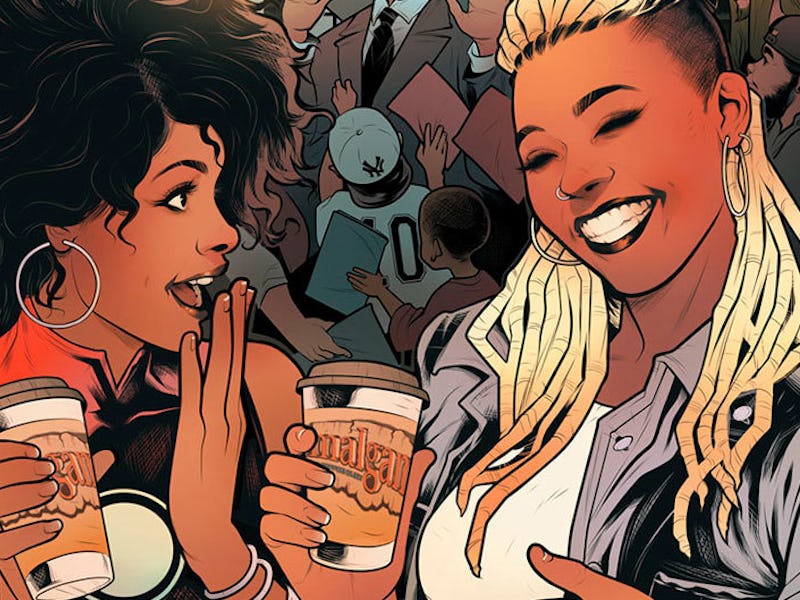Ariell Johnson isn’t just buying and selling comics at her shop, Amalgam Comics — she’s starring in them. Johnson, the first black woman to own a comic shop on the East Coast, will soon appear on a variant cover of Invincible Iron Man #1 with Riri, the first black woman to take on the role of Iron Man. And Johnson is hoping we see even more diversity in comic books, both on the page and off.
In an interview with Inverse, Johnson said she loves what Ironheart represents for young black female comic book fans — even though she’s more of a Storm fan at heart. Johnson said it’s important for women and people of color to have a chance to identify with iconic characters like Captain America, Thor, and Iron Man instead of only getting new characters who don’t have that decades-long legacy. It also helps that Riri Williams is a certifiable STEM genius, something she said we don’t see enough in black female representation.
“She’s a genius she got into MIT at 15 … breaking that stereotype for young black girls, who don’t see images like that, so they think they can’t achieve things like that,” Johnson said. “Well, you know what, Riri likes math, and now she’s Iron Man.”
It’s not just about the characters, it’s also about who’s creating them. As Johnson pointed out, comic book companies like Marvel and DC need to encourage more diverse hiring practices. As of now, Marvel’s only had one monthly comic written by a black woman in the history of the company, and DC’s had about three. And while Riri Williams may be a great step forward in representation, she’s currently written and designed entirely by white men.
“Not that if you were non-black or non-whatever, you can’t write a character that is, but in order for it not to seem weird or sound weird, it takes a lot of research, or it takes a person who identifies with that experience,” Johnson said.
Case in point: the recently pulled Riri Williams variant cover. Created by comic book artist J. Scott Campbell (who’s known for his pin-up style), the variant cover featured Riri in a sexualized pose, even though the character is 15 years old. Johnson said the sexualization was more indicative of the artist’s personal taste rather than cultural unawareness, but that Campbell did make a mistake regarding Riri’s hair.
“Her hair texture was straighter from the original concept of her. She has like a kinky fro; she has black girl hair. With an artist of color, again, that would’ve necessarily not been an issue, because you’re more culturally aware,” Johnson said.
Johnson added that she’s thankful for social media which has given fans a widespread outlet to advocate for diversity in comic books. The reality, though, is making a hashtag sometimes isn’t enough. Johnson said it’s also important to support independent comics, to show that audiences not only support diversity in tweets but also in sales. Plus, it’s a great way for audiences of any race, gender identity or other self-expression to see life through someone else’s eyes.
“I think that’s how you get more genuine stories and real insight to people,” Johnson said. “You might not necessarily come in contact with a certain type of person, but through art we can learn a lot about each other, even if we’re not in close contact with one another.”
Johnson recommended Zana from Emet Comics, a South African alt-history dystopian comic written entirely by women. You can stop by Amalgam Comics in Philadelphia to get one from Johnson herself, along with the Marvel variant cover which goes on sale in November. Who knows, you might even catch her making another parody music video for Instagram.
